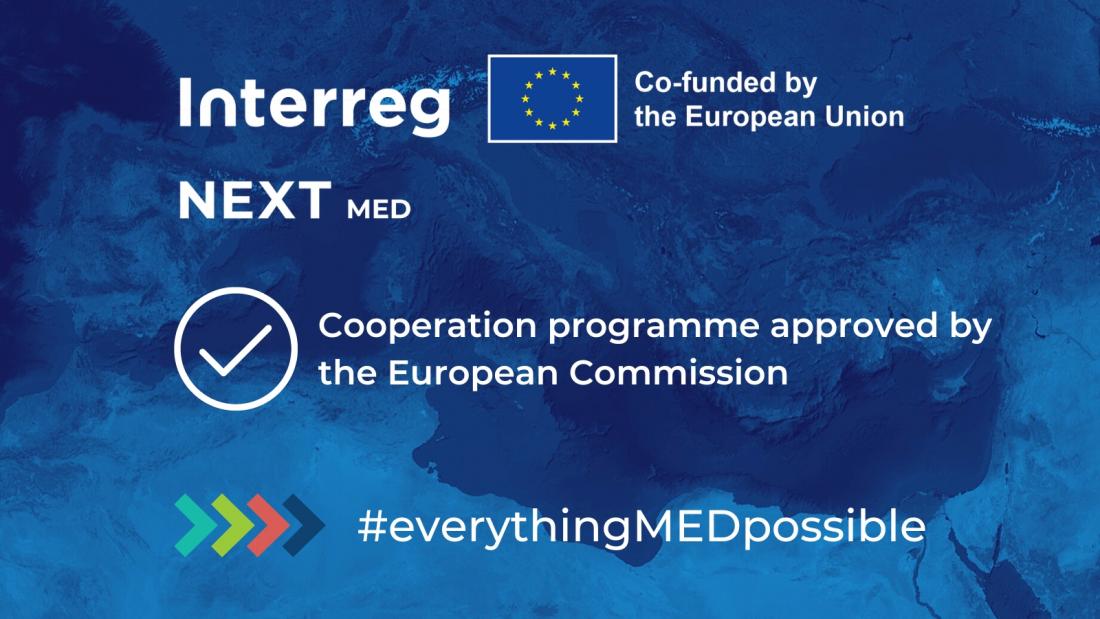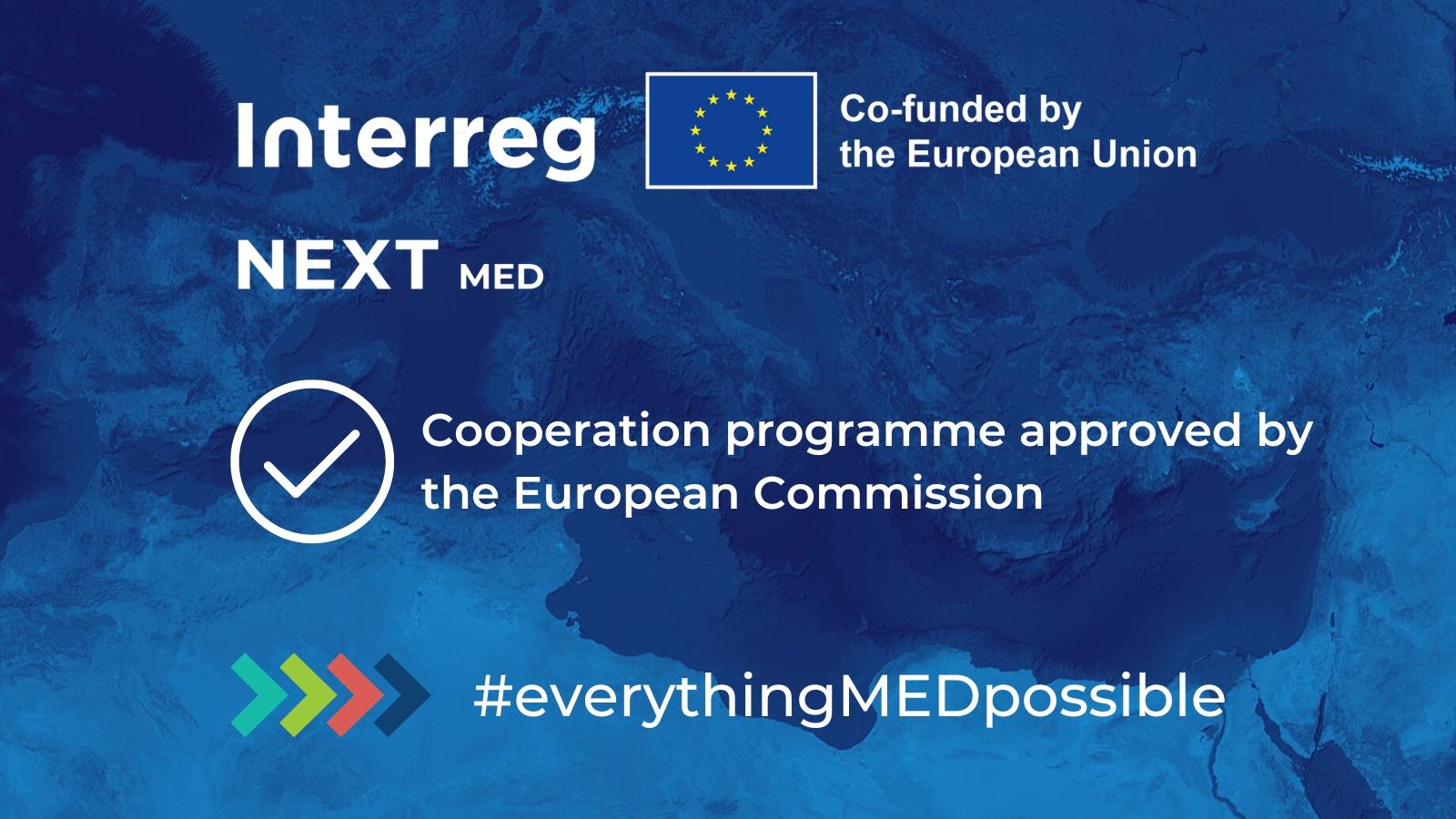European Commission approves Interreg ‘NEXT MED’ programme: €253 million to boost transnational cooperation among 15 countries in the Mediterranean area

The European Commission has approved the Interreg VI-B NEXT “Mediterranean Sea Basin” (NEXT MED) transnational cooperation programme involving 15 countries for an amount of €253 million of EU funding.
Interreg NEXT MED aims to contribute to smart, sustainable, fair development across the Mediterranean basin by supporting balanced, long-lasting, far-reaching cooperation and multilevel governance. The programme mission is to finance cooperation projects that address joint socio-economic, environmental and governance challenges at Mediterranean level such as the uptake of advanced technologies, competitiveness of SMEs and job creation, energy efficiency, sustainable water management, climate change adaptation, transition to a circular and resource efficient economy, education and training, health care, etc.
The cooperation area, home to over 200 million inhabitants, cover 15 countries: 13 of them which already participated in the previous editions of the programme - Cyprus, Egypt, France, Greece, Israel, Italy, Lebanon, Jordan, Malta, Palestine, Portugal, Spain, Tunisia - and two new members, namely Algeria and Türkiye (Turkey).
The global amount of the European Union contribution to the Programme is €253 million, including €230 million for project funding and €23 million for Technical Assistance (dedicated to management and implementation). The budget comes from the European Regional Development Fund (ERDF), the Instrument for Pre-Accession (IPA III) and the Neighbourhood, Development and International Cooperation Instrument (NDICI). The maximum EU contribution per project will be 90% of its total cost, while at least a 10% co-financing shall be ensured by the project partnership.
The first call for proposals, which budget should be around €100 million is expected to be launched starting from mid-2023 and will tackle all Programme Priorities and Specific Objectives. In parallel, the signing process of the Financing Agreements between each participating Mediterranean Southern country will be launched: this is a fundamental step to allow non-EU countries to participate in calls for proposals and be eligible to receive funding from the NEXT MED programme.
Stay tuned as more information will be available throughout 2023 and get ready to join this new Mediterranean cooperation adventure.
DOWNLOAD the Interreg VI-B NEXT Mediterranean Sea Basin (NEXT MED) approved by COMMISSION IMPLEMENTING DECISION C(2022) 9543 final of 12.12.2022
Quote(s)

At a time when the Mediterranean is facing many complex challenges, like the consequences of climate change, inclusive economic development, resilient education and healthcare systems, cooperation is more vital than ever to build a prosperous and peaceful future for all across the region. The Region of Sardinia, which leadership and management capacities have been recognised by a third consecutive mandate as Managing Authority, will continue to ensure the sound implementation of the programme and guide the process of expanding relations and building mutual trust among the countries of the Mediterranean region.
The approval of the Interreg ‘NEXT MED’ by the European Commission is an extraordinary result which recognises the quality and magnitude of the work carried out among the 15 participating countries in a spirit of collaboration and partnership. This result would not have been possible without the constant efforts of the Managing Authority to coordinate the whole preparation and drafting process of the programme, eventually defining cooperation priorities that reflect the needs of the countries involved.

- Priorities
-
NETX MED thematic strategy is structured around 4 broad priority, declined into 9 specific objectives as follows:
Priority 1 ‘A more competitive and smarter Mediterranean’ by
- Developing and enhancing research and innovation capacities and the uptake of advanced technologies
- Enhancing sustainable growth and competitiveness of SMEs and job creation in SMEs, including by productive investments
A total of €66.6 million is allocated to Priority 1, corresponding to 29% of the Programme budget.
Priority 2 ‘A greener, low-carbon and resilient Mediterranean’ by
- Promoting energy efficiency and reducing greenhouse gas emissions
- Promoting climate change adaptation and disaster risk prevention, resilience taking into account eco-system based approaches
- Promoting access to water and sustainable water management
- Promoting the transition to a circular and resource efficient economy
A total of €96.9 million is allocated to Priority 2, corresponding to 42% of the Programme budget.
Priority 3 ‘A more social and inclusive Mediterranean’ by
- Improving equal access to inclusive and quality services in education, training and lifelong learning through developing accessible infrastructure, including by fostering resilience for distance and on-line education and training
- Ensuring equal access to health care and fostering resilience of health systems, including primary care, and promoting the transition from institutional to family - and community-based care
A total of €48.8 million is allocated to Priority 3, corresponding to 21% of the Programme budget.
Interreg specific objective ‘A better cooperation governance for the Mediterranean’ by
- Fostering local governance models and processes through cross-sectoral, multilevel and cross-border partnerships, encouraging the cooperation and dialogue between citizens, civil society actors and institutions in view of addressing issues of joint interest at local level through transnational exchanges, bottom-up and participatory approaches.
A total of €17.7 million is allocated to the Interreg Specific Objective, corresponding to 8% of the Programme budget.
- Cooperation area
-
The cooperation area covers 15 countries, home to over €200 million inhabitants. Below is the list of eligible territories:
ALGERIA: Tlemcen, Ain-Temouchent, Oran, Mostaganem, Chlef, Tipaza, Boumerdes, Tizi Ouzou, Bejaia, Jijel, Skikda, Annaba, El-Tarf, Alger
CYPRUS: the whole country
EGYPT: Matruh, Al Iskandariyah (Alexandria), Al Buhayrah (Behera), Kafr-el-sheikh, Ash Sharqiyah (Sharkia), Al Daqahliyah (Dakahlia), Dumyat (Damietta), As Ismailiyah (Ismailia), Bur Said (Port Said), Governorate of Cairo
FRANCE: Languedoc-Roussillon, Midi-Pyrénées, Provence-Alpes-Côte d’Azur, Corse
GREECE: Aττική/Attiki, Βόρειο Αιγαίο/Voreio Aigaio, Νότιο Αιγαίο/Notio Aigaio, Κρήτη/Kriti, Aνατολική Μακεδονία, Θράκη/Anatoliki Makedonia, Thraki, Κεντρική Μακεδονία/Kentriki Makedonia, Δυτική Μακεδονία/Dytiki Makedonia, Ήπειρος/Ipeiros, Θεσσαλία/Thessalia, Ιόνια Νησιά/Ionia Nisia, Δυτική Ελλάδα/Dytiki Elláda, Στερεά Ελλάδα/Sterea Elláda, EL65 Πελοπόννησος/Peloponnisos
ISRAEL: the whole country
ITALY: Liguria, Campania, Puglia, Basilicata, Calabria, Sicilia, Sardegna, Toscana, Lazio
JORDAN: the whole country
LEBANON: the whole country
MALTA: the whole country
PALESTINE: the whole country
PORTUGAL: Algarve
SPAIN: Cataluña, Comunitat Valenciana, Illes Balears, Andalucía, Región de Murcia, Ciudad de Ceuta, Ciudad de Melilla
TUNISIE: Zaghouan, Kairouan, Sidi Bouz, Manouba, Siliana, Le Kef, Gafsa, Kebili, Tataouine, Jendouba, Beja, Bizerte, Ariana, Tunis, Ben Arous, Nabeul, Sousse, Monastir, Mahdia, Sfax, Gabes, Medenine
TURKEY: Tekirdağ, Edirne, Kırklareli, Balıkesir, Çanakkale, Izmir, Aydın, Denizli, Muğla, Manisa, Afyonkarahisar, Kütahya, Uşak, Antalya, Isparta, Burdur, Adana, Mersin, Hatay, Kahramanmaraş, Osmaniye - Background
-
Building on the experience and results of the ENPI (2007-2013) and ENI (2014-2020) cross-border cooperation (CBC) Med programmes, NEXT MED will continue supporting Euro-Mediterranean cooperation for the period 2021-2027 under the framework of the European Union’s Cohesion Policy and its specific ‘Interreg’ instrument which supports European Territorial Cooperation across regions and countries. NEXT MED is implemented under strand B ‘Transnational cooperation’ of the external dimension of Interreg, allowing for cooperation over larger transnational territories or around sea basins between EU Member States and Southern Neighbourhood partner countries.
Interreg is one of the key instruments of the EU supporting cooperation across borders. It tackles common challenges and finds shared solutions in areas such as health, environment, research, education, transport and sustainable energy. For 2021-2027, Interreg has a total budget of almost €10.1 billion covering 86 programmes and four strands: cross-border (Interreg A), transnational (Interreg B), interregional (Interreg C) and integration of Outermost Regions (Interreg D). The new Interreg NEXT cooperation programmes for 2021-2027 focus on cooperation between the EU and partner countries along the EU's external borders. Cooperation takes place in the areas of economic and social development, environmental protection, public health services, safety and security measures, connectivity, support to small and medium-sized businesses and entrepreneurship. Interreg NEXT has a total allocation of €1.1 billion from the European Regional Development Fund, the Neighbourhood, Development and International Cooperation Instrument and the Instrument for Pre-Accession.










